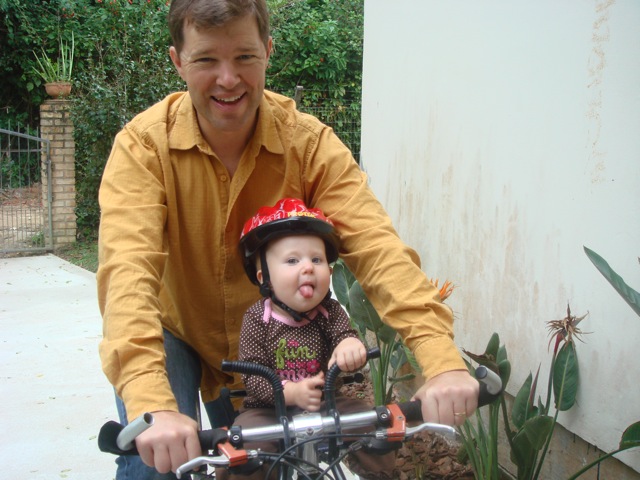As soon as the words escaped my mouth, I heard how silly they were. Yes, the Pocoyo cartoons that Helena loves so much are, in fact, made in Spain. She often watches to them on Youtube in Castillian Spanish. But "the real Pocoyo?" I wanted to indicate something "more" than the plastic Pocoyo toy she plays with every day, but could I possibly say that the video of Pocoyo, something that exists only as the 1s and 0s of a computer program, is any more "real" than the plastic and rubber Pocoyo she was playing with?
 In the late 1980s, the French philosopher Jean Baudrillard made quite a splash on the academic scene with his idea of the simulacrum, defined as "the copy for which there is no original." He saw this phenomenon everywhere in postmodern culture, from the fake culture of Disney's Epcot to Hollywood movies, but it seems that a plastic doll representing an electronic cartoon, where there was never even a "real" drawing of Pocoyo, stands at the peak of the pyramid of simulacra. When we think of the intentionally decontextualized world in which Pocoyo lives, where the background is pure white most of the time, it becomes even harder to imagine an original of anything having to do with the character.
In the late 1980s, the French philosopher Jean Baudrillard made quite a splash on the academic scene with his idea of the simulacrum, defined as "the copy for which there is no original." He saw this phenomenon everywhere in postmodern culture, from the fake culture of Disney's Epcot to Hollywood movies, but it seems that a plastic doll representing an electronic cartoon, where there was never even a "real" drawing of Pocoyo, stands at the peak of the pyramid of simulacra. When we think of the intentionally decontextualized world in which Pocoyo lives, where the background is pure white most of the time, it becomes even harder to imagine an original of anything having to do with the character.For all of the nihilism of Baudrillard and his followers, a heavy tone of moralism always accompanied their talk of simulation and simulacra: it was as if they said, "This is how the world is now, but it wasn't always this bad." After all, the basis for most Western philosophy is Plato's theory of the forms, some original "real," of which all of the things we see in our world are nothing but copies. Plato condemned art because it was a copy of the things of the world, and as such, really only a copy of a copy, derivative to the second level.
 Pocoyo, however, seems to steal the fire from the moralizing postmodernists. Pocoyo isn't a copy of a real boy, and his world is not a copy of ours. Certainly there are some references to things that we know, but we don't judge Pocoyo by whether it is true to reality or not. It's not about representation at all. It's about fun. About play. And though we may play-act, though children may pretend to be something when they play, we don't principally judge a soccer game or play with dolls by whether it "truly represents the world." We can call it good or bad, beautiful or ugly, but never true or false. Play escapes the logic of the real and of truth. It's something else entirely.
Pocoyo, however, seems to steal the fire from the moralizing postmodernists. Pocoyo isn't a copy of a real boy, and his world is not a copy of ours. Certainly there are some references to things that we know, but we don't judge Pocoyo by whether it is true to reality or not. It's not about representation at all. It's about fun. About play. And though we may play-act, though children may pretend to be something when they play, we don't principally judge a soccer game or play with dolls by whether it "truly represents the world." We can call it good or bad, beautiful or ugly, but never true or false. Play escapes the logic of the real and of truth. It's something else entirely.And the "real Pocoyo?" Who cares. What matters is how Helena makes her doll run around, take baths, cook, slide down the couch. It's about play, not about truth.


















